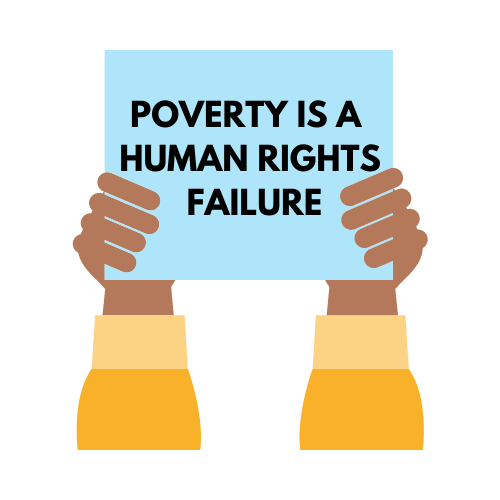

Ashley McLean, Policy & Parliamentary Officer & Lydia Murphy, Development Officer
The Poverty Alliance
Poverty means being unable to make ends meet, it means making sacrifices, and it means a life where you are not afforded dignity. Human rights are minimum standards developed to ensure we are all able to lead dignified lives, but we know that poverty and inequality are creating a human rights crisis in Scotland and the UK.
Poverty is both a cause and a consequence of human rights failures. This understanding of poverty has underpinned the development and delivery of our Rights in Action project and our work at Poverty Alliance more broadly. We therefore strongly welcomed the Scottish Government’s consultation on a Human Rights Bill for Scotland.
If this Bill were to be introduced in its most comprehensive form, then for the first time in Scotland’s history, public bodies would have to consider all our human rights when delivering services like housing, social care, or social security. This would represent a transformational shift in power and could ensure that the policy and practice of public bodies must work in the interest of people and communities.
Back in 2020, alongside Human Rights Consortium Scotland (HRCS), the Poverty Alliance began speaking to people with experience of poverty to ask them what they believed should be central components of a Human Rights Bill for it to work for people living on low incomes in Scotland. People told us that generally many of us are unaware of our specific rights and how to enforce them. They told us that the language around Human Rights is too technical for it to be reasonably accessible or challenged. Additionally, they were clear that there is a dearth of support and information available for people to claim their rights and challenge violations. This is not right.
In our consultation response, we therefore highlighted that the only way to ensure that Human Rights are realised for people living on low incomes is to ensure that people living on low incomes are involved at every stage: in deciding the minimum level of each right that is acceptable for Scotland; in the development of policies that impact their rights; and in the monitoring and scrutiny of how well every level of government is doing to keep its human rights promises.
This means ensuring information about rights is available in a range of formats and written in clear, concise and jargon-free language. It means ensuring that people are adequately supported to challenge rights violations through clear complaints processes that take a trauma informed approach, the provision of mental health support, and access to adequate and free legal aid. It means ensuring that courts work for people, can call for structural change, aren’t prohibitively expensive and that people have a say in the remedy that works for them if things go wrong.
In our consultation response we call on Scottish Government and public bodies to review their budgets to ensure that public bodies are able to deliver for their communities. We call on them to utilise human rights-based budgeting, and to maximise the resources that are available to ensure no one falls behind in line with the requirements set out in international law.
This Bill has the potential to usher in a significant shift in who will hold the power to realise human rights and how we can hold our government and public bodies accountable for this. Scottish Government needs to ensure that this legislation is strong, workable and informed by the voices of lived experience. If done right, the change could be transformational and could change lives across Scotland for the better.
We hope the Scottish Government does right by rights holders in Scotland and give this Bill the strength is needs to ensure Scotland is a place where we all are afforded dignity.


Enter your email address to receive regular e-updates about our work. If at any time you want to stop receiving these, simply contact us. We’ll keep your details safe and won’t share them with any other organisations for their marketing purposes. For full details see our Privacy Policy.